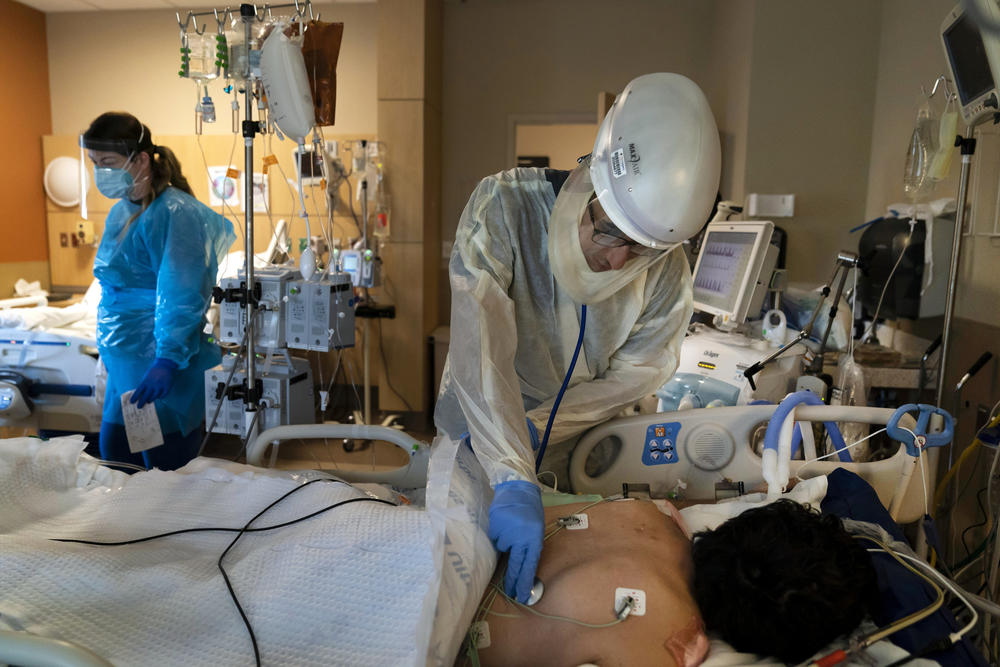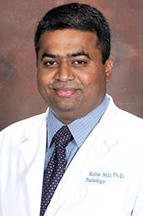
Caption
A new, first-of-its-kind study from Augusta University finds a person’s genetic makeup could put them more at risk for severe COVID-19 infection.
Credit: (AP Photo/Jae C. Hong, File)
A first-of-its-kind study from Augusta University finds a person’s genetic makeup could put them more at risk for severe COVID-19 infection. GPB’s Ellen Eldridge reports.

A new, first-of-its-kind study from Augusta University finds a person’s genetic makeup could put them more at risk for severe COVID-19 infection.
Early in the pandemic, scientists noticed a striking difference among patients infected with COVID-19. Some remained asymptomatic, while other seemingly healthy people wound up in intensive care.
For example: Renee and Clyde Smith, both in their 80s, were the first Georgians to test positive for COVID while on a cruise early in March 2020.
Renee and her husband of 59 years were at first quarantined off the coast of Japan aboard the Diamond Princess cruise. They spent nearly a month quarantined first aboard the ship and then in a hospital in Japan.
When the new disease took hold in the U.S., it was people in their age group — over 65 — who were most at risk for death. But while Clyde developed pneumonia, the infection resolved early and neither he nor his wife experienced further symptoms of COVID-19.
MORE: As This Atlanta Couple Returned Home A Year Ago, Georgia Marked Its First COVID-19 Death
Dr. Ravindra Kolhe, a molecular and genetic pathologist with the Medical College of Georgia at Augusta University, said some patients appear to have a predisposition toward extreme inflammatory response that can lead to multiple organ failure. This is known in the medical community as “cytokine storm” because the immune system reacts to infection by flooding a patient’s bloodstream with inflammatory proteins called cytokines, which kill tissue and damage the heart, lungs and other vital organs.
The study, published by the international collaborative COVID-19 Host Genome Research consortium in the journal iScience, examines whether some patients have a genetic predisposition for severe complications after SARS-CoV-2 infection.
“Our data show that large (structural variants) identified using optical genome mapping might further explain the inter-individual clinical variability in response to COVID-19,” the investigators wrote.

Dr. Ravindra Kolhe
Everyone gets the exact same infection, Kolhe said, but some of us will get really sick. Three specific genes have been identified in patients who became severely ill, he said.
A few genes in the nasal and oral cavities make it easier for the virus to get inside cells and multiple more quickly, Kolhe said.
“These are the genes which are making these inflammatory cells come really fast and strong,” he said. “The three different aspects of the genome [are] really helping us to understand why some of us are getting really sick while [a] majority of us are absolutely asymptomatic.”
Investigators used optical genome mapping to get a thorough, three-dimensional assessment of the genome of 52 patients severely ill with COVID-19.
Genome basically means all the information in each person’s DNA, Kolhe explained.
This genetic information affects the way people look, behave, and act, he said, including the way patients respond to vaccines and medications.
“Physicians are scientists [who have been] trying to understand the human genome for a long time to see what differences we have and how these differences are actually making a difference in our survival,” Kolhe said.
Kolhe, who is also associate director for genomics at the Georgia Cancer Center, has been using optical genome mapping to look for patient-specific cancer-causing variations.
Some studies have found that blood type might be a factor in predicting COVID risk, specifically type A, and there have been some specific gene findings as well that predispose to immune deficiencies that may make people more susceptible.
This study is trying to more closely identify people most at risk of severe COVID disease.
Once identified, the goal would be to initiate proactive moves for these individuals such as ensuring vaccination and boosting and potentially more aggressive treatment early on, such as monoclonal antibody therapy, to help these individuals better combat COVID, Kolhe said.
Even the amount of virus in an individual does not directly correlate with how sick the individual gets, the study shows.
“We had individuals with very high viral loads who did not even know they were positive,” Kolhe said. “It is something in the host genome that is different.”
The latest data from the state Department of Public Health show 27,750 Georgians have died from complications of COVID disease.